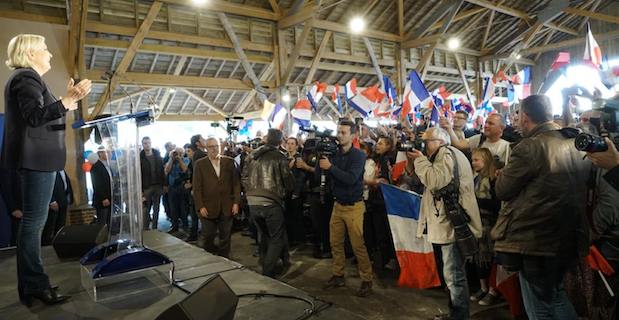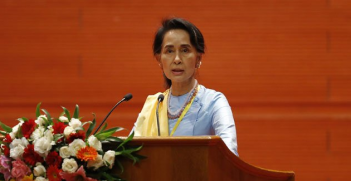Fear and Opportunity in the Fifth Estate

What a strange French presidential campaign it has been so far. The poor-quality, policy free debate has been based on opposing visions of the future: one is declinist, supported by strategies of fear, and the second is optimistic, promoting a strategy of opportunity.
With a few weeks to go until the first round of the French presidential election, many people in France are stunned by the low quality of the debates, which have been largely dominated by François Fillon’s legal saga. There has, to date, been very little in-depth discussion about actual policy.
So much of this debate seems to be a distraction from the business of governing. And yet behind the highly mediatised judicial turmoils of some of the candidates, it is becoming increasingly clear that the debates in France’s presidential campaign are about two significantly opposed visions of the future: one is declinist, supported by strategies of fear, and the second is optimistic, promoting a strategy of opportunity.
Currently, three candidates claim that they represent a majority of the French people, haunted by a fear of French decline, and deeply anxious about France’s role in an increasingly globalised world. This approach of anxiety and a threat perception is represented by Marine Le Pen, leader of the Far-Right party le Front National, by Jean-Luc Mélenchon, candidate for the Far-Left movement la France insoumise, and by François Fillon, candidate of the conservative party Les Républicains.
On the other hand, there is a very different strategy, developed by Benoît Hamon, candidate for the Socialist Party, and, more importantly, Emmanuel Macron, leader of En Marche!. What is remarkable is that both candidates promote a far more optimistic vision of opportunities for a better life and a better France.
Of course, far-left Mélenchon and far-right Le Pen are diametrically opposed in many respects. Nonetheless, as Ernst Nolte showed in his analysis of the similarities and differences between fascist regimes, Far-Right and Fa-Left programs also often converge. Le Pen and Mélenchon share four similar diagnoses of the economic, identity and societal insecurities that France is currently facing.
Firstly, both Mélenchon and Le Pen base their strategies on anti-EU policies, claiming that France’s economic independence requires a withdrawal from the eurozone, from the European Union’s treaties, and even, in the case of Le Pen, an exit from the EU as a whole: a Frexit in the style of the UK’s Brexit. Secondly, both leaders adhere to significant anti-globalisation policies. Le Pen and Mélenchon both claim that France’s economic difficulties come from its openness to the global market and their remedy is protectionist policies.
A third common approach in narrative is that both of these candidates play on the rejection of traditional elites and both present themselves as anti-system. This strategy has been successful as a populist strategy, even though they both belong to the system they loudly condemn, a trait that observers of Donald Trump will recognise. Le Pen’s family is extremely wealthy and deeply connected to France’s aristocracy and Jean-Luc Mélenchon was a minister in a former Socialist government. A final similarity is that both candidates claim to genuinely defend the working class and advance similar social policies, especially to lower the pensionable age to 60 years.
As Nolte might have predicted several decades ago, these similarities partly attract the same electorates: the working class and the less-educated sections of society that have not benefitted from globalisation. However, the far left has been associated with policy failure because Mélenchon has been in government in the past, and so the strategy of fear currently mainly reinforces Le Pen’s popularity rather than that of Mélenchon.
The current graphic representation of the far right electorate in France tends to be an overlay of the traditional map of the communist and far left electorate until the 1990s, when the communist party (PCF) lost its appeal. According to a poll carried out in early March this year, 48% of the French working class now supports Marine Le Pen’s program.
More broadly, both candidates call for the return to an idealised—and historically inaccurate—past. According to Marine Le Pen, France’s salvation will come from a return to a traditional society that does not value any diversity, implementing strict assimilation policies. For Mélenchon, the solution is a return to a protectionist economy that is supportive of a strong working class. So essentially these two candidates use the language of fear to present a choice of a clash of civilisations for Le Pen, or a class struggle for Mélenchon.
The conservative candidate François Fillon is not as pessimistic as these extremes, although he does call for tough austerity measures. As the leader of Les Républicains, Fillon’s main remedy to France’s economic difficulties consists in drastically reducing state expenditures to shrink the country’s public deficit. For example, Fillon promises to reduce the administration by 500,000 public servants. This conservative candidate claims that the French must tighten their belts for the next five years in order to avoid a situation like Greece. Here too we observe that Fillon’s strategy also promotes the idea that globalisation constitutes an obstacle to France’s autonomy, identity and prosperity.
What then of the two youngest candidates in the presidential election, who have developed their strategies with a distinctly optimistic tone? Emmanuel Macron and Benoît Hamon, whose programs are significantly different, share a discourse around the politics of opportunity. Both candidates promote a strategy of welcome and acceptance when it comes to immigration and refugees, with Macron going so far as to seek to implement Merkel’s policy in France. At a time of continued crisis in the EU, both candidates promote a significant deepening of EU integration. In fact Hamon is in favour of the strengthening of the eurozone and Macron has made the development of a genuine European army and diplomacy a priority.
Emmanuel Macron seems to have hit on a successful strategy, at least for now. His centrist approach has become very popular and Macron is now the highest-ranking candidate in the polls. What is more, many politicians from the left and the centre have publicly supported him, as they calculate that En Marche! constitutes the most efficient weapon against Marine Le Pen. However, Macron, like Hamon, struggles to convince many workers that there are benefits for them in a globalised economy. Macron’s electorate is currently limited to the most educated part of the population which has been the main beneficiary of globalisation.
It is still difficult to predict who will be the next French president. The campaign has an increasingly populist dimension, as all candidates seek to deal with the disaffection with established parties and political elites. What is clear is that the campaign reveals narratives of two very distinctive Frances: one that perceives an ever more globalised economy as a direct threat and another that perceives challenges as opportunities.
After the Brexit vote and the election of Donald Trump, and in an era of growing public contestation, will French voters halt the declinist and populist wave in some Western democracies?
Paul Soyez is a researcher on French-Australian relations at the University of Melbourne. He is also a lecturer in history and has taught at the Paris-Sorbonne University and Sciences Po Paris.
Philomena Murray is a professor in the School of Social and Political Sciences at the University of Melbourne, and research director on Regional Governance in the EU Centre on Shared Complex Challenges. She holds honorary positions in Trinity College Dublin, College of Europe Bruges and the UN University Centre for Comparative Regional Integration Studies.
This article was co-published with Election Watch and The Conversation under a Creative Commons Licence. It may be republished with attribution.





